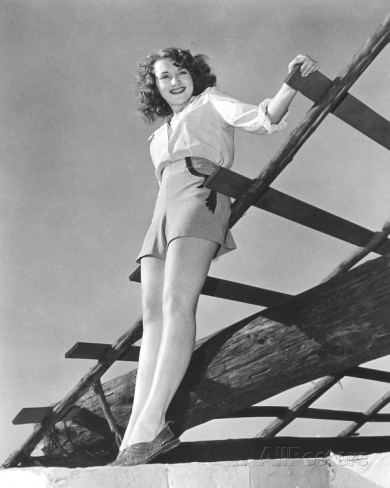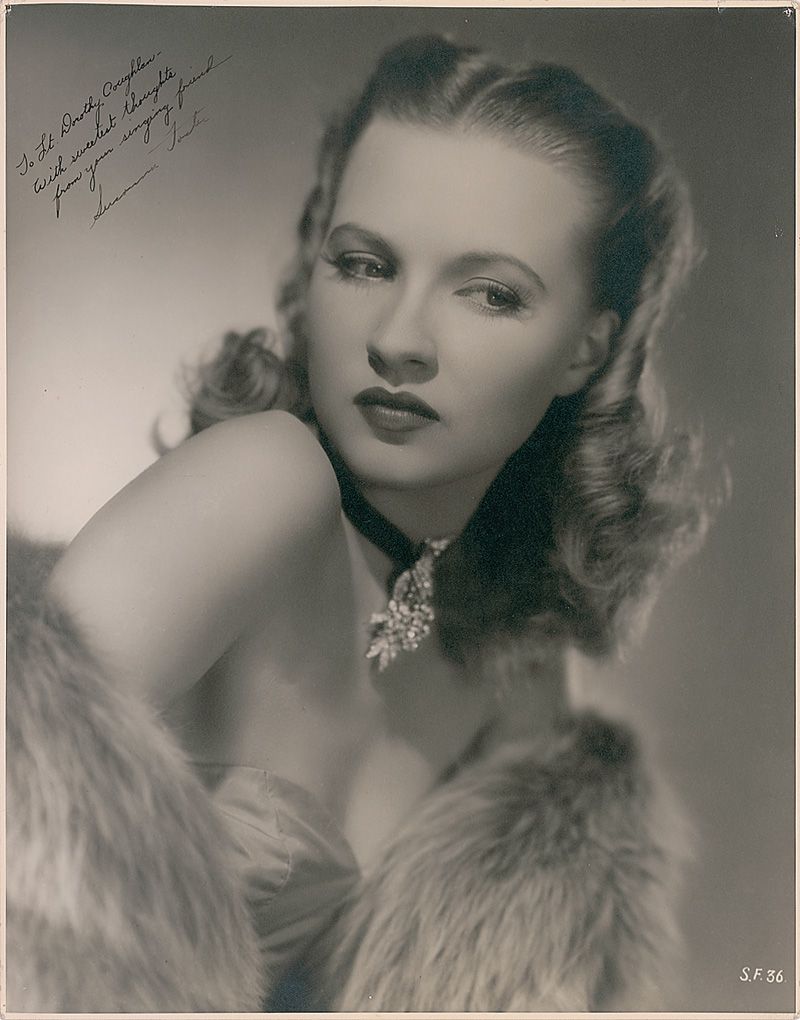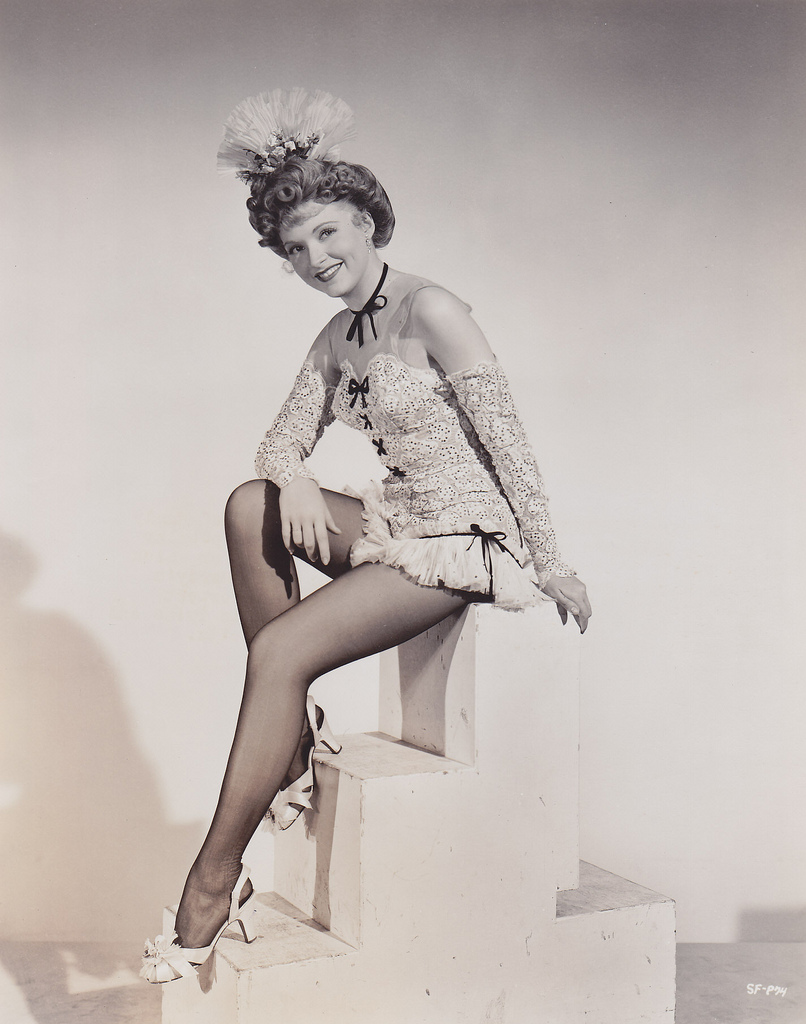Susanna Foster (Suzanne DeLee Flanders Larson)

Susanna Foster was born in Chicago, Illinois, and raised in Minneapolis, Minnesota. She was taken to Hollywood at the age of twelve by MGM, who sent her to school and groomed her for an acting and singing career. Two of her classmates at this school were Mickey Rooney and Judy Garland. She claimed the high point of being at MGM was meeting her idol Jeanette MacDonald and Clark Gable, who treated her like “the Queen of England.” Foster was originally slated to star in the MGM production of B Above High C, a film that was never made. The movie’s title referred to the top of her vocal register. After hiring agent Milo Marchetti, Susanna Foster was signed by Paramount Pictures where she began to study voice for the first time with Marchetti’s sister Gilda. She soon would go on to make her first film at fourteen years of age where she was introduced as ‘Susanna Foster’ in The Great Victor Herbert (1939) opposite Mary Martin and Allan Jones. After seeing Foster in The Great Victor Herbert, William Randolph Hearst flew her to his 67,000-acre (270 km2) estate Wyntoon for a private recital for him and Marion Davies. The following year for Paramount she appeared in There’s Magic in Music opposite Allan Jones and Glamour Boy opposite Jackie Cooper. She then signed with Universal Studios, where she portrayed the ingénue in the 1943 film version of the Gothic melodrama Phantom of the Opera opposite Nelson Eddy and Claude Rains. The film garnered two Academy Awards and was Universal’s biggest money-maker that year. Hearst columnist Louella Parsons, who had the power and reputation to make or break stars, stated, “Susanna Foster establishes herself as one of the great stars of today.” She became so popular the studio set her on a meteoric rise with back-to-back pictures during the years 1943 to 1945, including Star Spangled Rhythm, Top Man, This Is the Life, The Climax, Bowery to Broadway, Frisco Sal, and That Night With You.
Despite the meteoric rise that delivered a wondrous prosperity to her poverty-stricken family and a dozen movies for Universal and Paramount on her resume, she abruptly quit the film business in 1945. She also turned down a joint concert tour with Nelson Eddy, which she later regretted. She soon would attempt to rescue her two younger teenage sisters by selling her mink coat and renting the home of actress Jean Arthur, who was living in Monterey, California at the time. Desperate to hold onto its star, Universal sought to make her dream of grand opera come true, financing a six-month tour of a post war Europe in 1946 with Dusolina Giannini. On her return from Europe, she was pressed by Universal to appear as guest soloist for the White House Press Photographer’s Ball with President Harry Truman and Eleanor Roosevelt in attendance. After the performance, Truman and Roosevelt praised Foster with their turn at the microphone. She shared the table with Roosevelt, Truman, and his daughter Margaret. With Margaret being only ten months Foster’s senior and an aspiring singer herself, she was thrilled to meet the musical guest. Back in New York, she accepted the lead role in the Los Angeles Civic Light Opera’s production of Naughty Marietta headed by Rodgers and Hammerstein associate Edwin Lester. In 1948 she married her leading man Wilbur “Wib” Evans, a renowned baritone 20 years her senior. The couple performed in operettas and stage musicals, touring extensively. After a debilitating miscarriage, their first son Michael was born 8 weeks premature in December 1950.
Evans was soon chosen as Mary Martin’s co-star in London’s South Pacific, the show that gave Sean Connery his start as a dancing and singing sailor. During the London engagement is when their second son was born, brought into the world by Queen Elizabeth’s doctor, John Peel, who also attended in the births of others to the Royal family, including Prince Charles and Princess Anne. Philip was named in honor of the Queen’s husband Prince Philip. Susanna Foster did make several attempts at a comeback. In 1962, Arthur Lubin, the director of her hit film Phantom of the Opera offered her several spots on TV shows at the time including Mr. Ed of which he was producer. One of the stipulations was that she would have to relocate to Los Angeles with her two boys.[citation needed] Evans reportedly became enraged, immediately taking Foster to court suing for custody of the two boys. It was a public fight with articles in many of the New York and Philadelphia papers, with one headline declaring “Wilbur Evans Calls Ex-Wife Beatnik.” Evans lost the custody suit but was successful in keeping his ex-wife from living further than “100 miles of Columbus Circle” in New York City. Evans would soon withhold payments for rent, alimony and child support, disappearing from the lives of his two boys. Soon, Foster and her two boys Michael and Philip were evicted and lived for a time in several hotels on the upper west side of Manhattan. Susanna Foster found work as a receptionist for several Wall Street firms and an answering service operator. She would often work 80 hours a week trying to make a home for her two boys. For the bulk of this time they lived in a small one bedroom apartment on West 82nd street in New York City. This was when the boys became “latchkey kids” and “things went terribly down hill from there” as Foster would later tell a reporter.
In 1985 Philip lapsed into hepatic coma (liver failure) on Foster’s living room floor and died three days later in the Van Nuys Hospital. Her surviving son, Michael, brought her back to the East Coast, where she spent the last five years of her life living at the Lillian Booth Actors Home. Susanna Foster died unexpectedly at 5:30 a.m. EST on January 17, 2009 (aged 84). She had been residing at The Lillian Booth Actor’s Home in Englewood, New Jersey since 2003.
Born
- December, 06, 1924
- USA
- Chicago, Illinois
Died
- January, 17, 2009
- USA
- Englewood, New Jersey
Cemetery
- Old Southeast Church Cemetery
- Putnam County, New York
- USA



